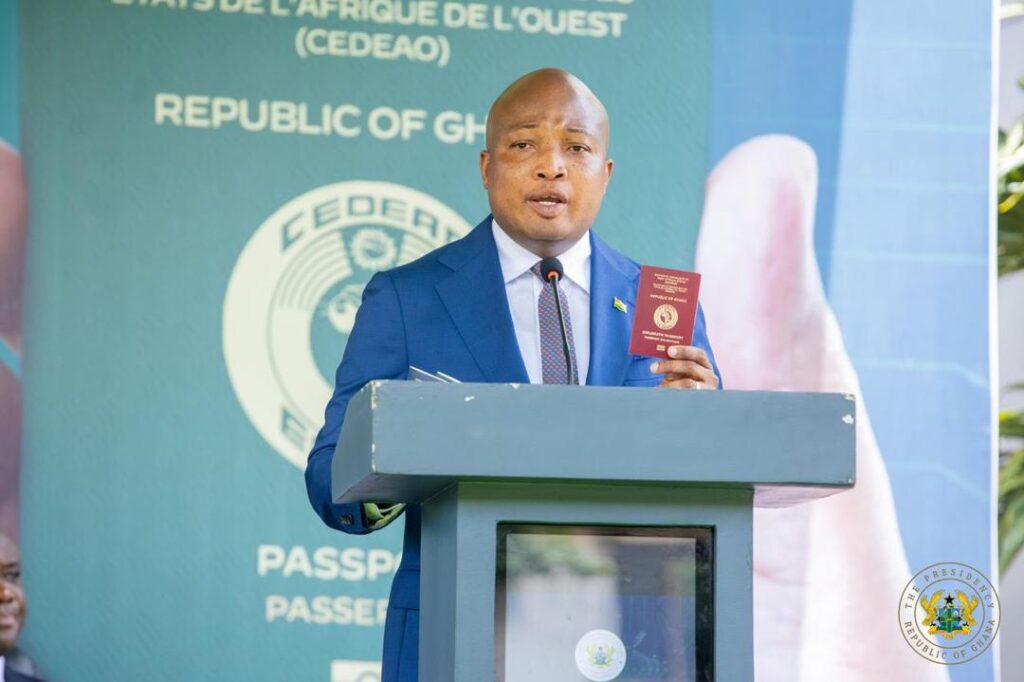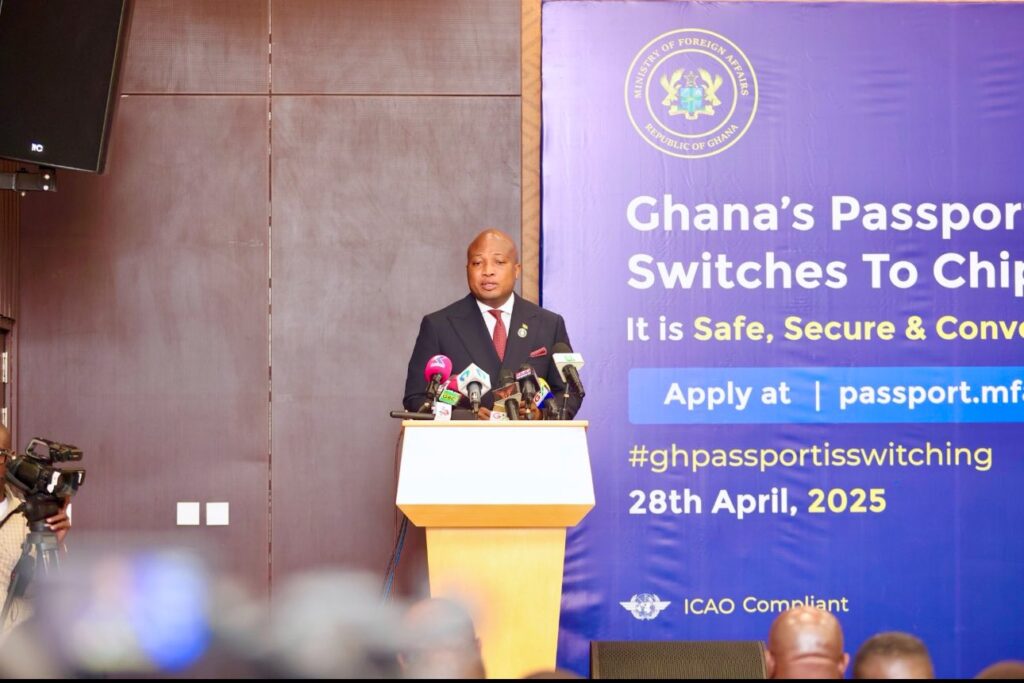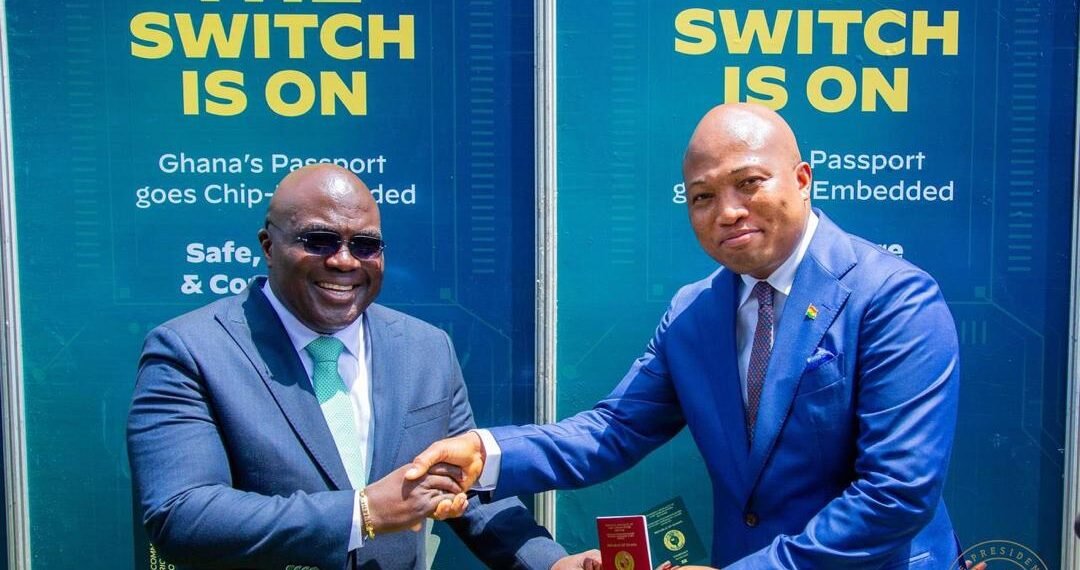Ghana has made a historic leap in its passport administration system with the mass roll-out of the country’s first chip-embedded passports, coupled with sweeping reforms designed to eliminate bottlenecks, frustrate corruption, and restore dignity to applicants.
At a high-level ceremony held in Accra, Hon. Samuel Okudzeto Ablakwa, Minister for Foreign Affairs, described the day as the “most far-reaching and progressive passport reform ever experienced in Ghana’s entire history.”
Speaking passionately at the event, Hon. Ablakwa outlined the scale of frustration Ghanaians had endured in acquiring passports — from unbearable delays, pervasive middlemen known as goro boys, to the shocking figure of nearly seventy thousand uncollected passports piling up due to applicant fatigue.
“The red tape, the bureaucracy, and the total inertia just make them give up. Today, we are ending all of that. Esteem guests, today, we reset and usher in a new era of modernisation, of convenience, and of deep respect for the Ghanaian passport applicant.”
Hon. Samuel Okudzeto Ablakwa, Minister for Foreign Affairs
Unlike previous ceremonies limited to symbolic launches, Hon. Ablakwa noted that the event was different as the Mahama administration seeks to reset the country’s passport application system.
Attendees, including members of the media and bloggers, were encouraged to go through an expedited online application process on site — with assurances that their new chip-embedded passports would be delivered to them before the event concluded.
Hon. Ablakwa emphasized the readiness of his Ministry, noting that even President John Dramani Mahama had already received and enthusiastically endorsed his new chip-embedded passport, describing it as “a total game-changer.”

Former Presidents Nana Addo Dankwa Akufo-Addo and John Agyekum Kufuor according to the Minister were also being issued their chip passports, ensuring that all living former leaders are included in the historic transition.
“There has been much talk of chip-embedded passports since 2010. When ICAO asked countries to prepare to meet its new requirements consistent with ICAO regulations, DOC 9303.
“But I must say that this is the first time Ghana is having a mass rollout, and it is being done together with our progressive reset reforms as a full package. So today we are not only launching but also rolling out these chip-embedded passports, but we are doing it as a full package”.
Hon. Samuel Okudzeto Ablakwa, Minister for Foreign Affairs
Far-Reaching Reforms
Central to these reforms is the nationwide switch from the old biometric passports to the new chip-embedded passports.
In addition to introducing a more secure and internationally compliant passport, Ghana has also become one of the first institutions to operationalize President Mahama’s broader 24-hour economy vision by launching 24-hour passport processing services.

According to Hon. Ablakwa, applicants can now access services around the clock, a major deviation from the traditional, limited working hours that often excluded many citizens, especially those outside urban centers.
In another significant innovation, Ghanaians no longer need to physically return to passport application centers to retrieve their documents.
For the first time, the Ministry is offering direct passport delivery to applicants through courier services.
In a country where not every region even has a passport application center — requiring arduous, costly travel for many — this reform is particularly revolutionary.
Hon. Ablakwa cited the plight of residents in the Upper East Region, who often had to undertake a four-to-five-hour journey to Tamale, just to access passport services. “Today,” he said, “we are ending that.”

The primary partner for the delivery system will be Ghana Post, with Trustkit Company Limited — a fully Ghanaian-owned entity — acting as a junior partner.
Hon. Ablakwa highlighted the pride in entrusting this vital national service to local companies, stressing that Ghanaians are capable of running essential sectors without foreign intermediaries.
Another major advancement is the introduction of an electronic tracking system to enhance transparency and accountability in the passport application process.
This system allows applicants to monitor the progress of their passport at every stage — from submission, approval of documents, production, to final delivery.
Notifications will be provided throughout the process, and once the passport is dispatched, applicants can even track the courier’s movement in real-time.
Upon delivery, biometric confirmation will be required to complete the handover, with proxy deliveries allowed only in exceptional, clearly documented cases, such as medical emergencies.
This e-tracking innovation not only enhances transparency but aims to finally defeat the “goro boys” culture.
Hon. Ablakwa explained that middlemen flourished in the past because of inefficiencies and delays.
However, with guaranteed delivery of ordinary passports within 15 days and expedited ones within 5 days, the era of paying exorbitant bribes to intermediaries would come to an end.
“Once we deliver your passport in under 15 days, and under five days for expedited service, who will go and pay two, three, four thousand Ghana Cedis to a goro boy?”
Hon. Samuel Okudzeto Ablakwa, Minister for Foreign Affairs
In a further demonstration of government’s commitment to citizen welfare, Hon. Ablakwa announced a reduction in passport application fees.
Effective soon — pending parliamentary approval — the fee for an ordinary passport will be reduced from GHS 500 to GHS 350.
Hon. Ablakwa acknowledged that many Ghanaians had heard about the planned fee reduction but were concerned that it had not yet reflected online.
He clarified that Parliament’s return from recess will see an amendment to the Fees and Charges Act to formalize the reduction.
Describing the philosophical foundation behind the price cut, Hon. Ablakwa stated, “Passports are not luxury documents. They should be affordable and accessible to all Ghanaians.”

He praised the Cabinet’s approval of the new fee structure and assured that affordability would remain central to future government policy decisions on vital documents.
Beyond the excitement of the new processes, Hon. Ablakwa emphasized the security benefits of the chip-embedded passport.
The polycarbonate biographical data page, combined with both latent and patent security features, significantly reduces the risk of forgery, impersonation, and other identity-related crimes.
Given the global rise in passport fraud and document-related crimes, Ghana’s move into this space with advanced features provides reassurance not only to the government but to international stakeholders monitoring document security standards.
In closing, Hon. Ablakwa called the reforms a “generational passport” moment for Ghana — a bold, visionary leap that meets the dynamic demands of modern security and citizen convenience.
As Ghana rolled out the first-ever chip-embedded polycarbonate passports, Hon. Ablakwa assured sector players, end-users, and regulators of a robust, advanced system that is virtually impossible to breach.
READ ALSO: Ethiopia Nears IMF Loan Review Deal, Eyes Debt Talks



















